A Brief History of the Independent Spirit Awards, Part Two: 2001-2025
Read part 1 here.
Hosted by John Waters, the 16th annual Independent Spirit Awards (allow us here to retcon this as the 16th annual Film Independent Spirit Awards) took place on March 24, 2001, underneath the big white tent at the ceremony’s now-regular home on the beaches of Santa Monica. Crouching Tiger, Hidden Dragon was the afternoon’s big winner, with Ellen Burstyn (Requiem for a Dream) and Willem Dafoe (Shadow of a Vampire, as cinema’s third–but certainly not last!–Nosferatu) taking home top acting honors.
The next day, Gladiator would win Best Picture at the 73rd Academy Awards. But perhaps more significantly, this was also the night that the fifth episode of Season Three of HBO’s The Sopranos aired. Though not a particularly memorable episode in and of itself the show was nevertheless peaking in public adulation, marking the ascent of the so-called “Golden Age of Television”–a global shift in audiences’ consumer preferences which continues to influence and impact cinema, and the Spirit Awards, to this day.
The story of the Film Independent Spirit Awards during the second half of its presently accumulated 40 years is a story of contrasts–of entrenchment running parallel with reinvention; reactive to trends yet committed to core values. It was also two decades full of very funny and often very weird on-stage moments.
In the years following the Miramax boom of the 1990s, the line between studio filmmaking and independent cinema became blurrier than ever, with shingles like Fox Searchlight, Paramount Vantage and Sony Classics sharing space with mega-minors like Lionsgate, Focus and New Line–which suddenly found itself in the billion-dollar box office business with the independently-produced Lord of the Rings trilogy.
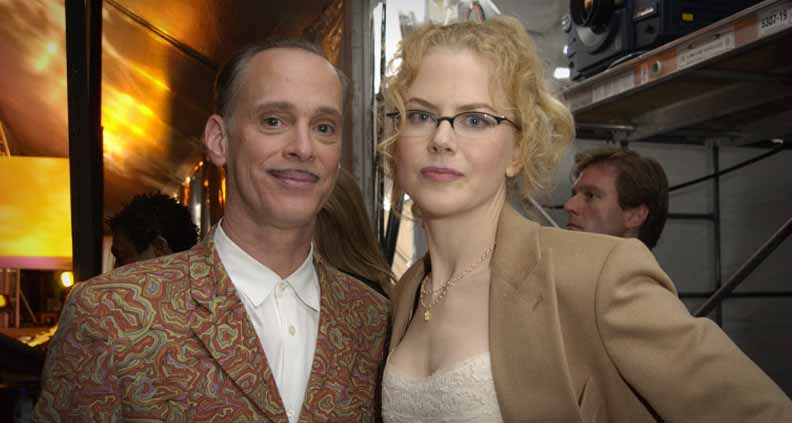
Picking up right where Buck Henry left off, counterculture icon John Waters became the Spirit Awards semi-permanent host for the first half of the 2000s, hosting the show four times between 2001 and 2004. These years saw a number of memorable moments, good, bad and cringe–see poor Brittany Murphy’s presenter meltdown in 2003, Mickey Rourke’s rambling defense of Eric Robert’s employability in 2009, or Derek Luke’s triumphant journey from Spirit Awards cater-waiter to Best Male Lead winner (also 2003). Plus countless others. Through this period the show was in its groove, thanks in part to a steady partnership with IFC, which had been broadcasting the ceremony on cable airwaves since the early ‘90s.
But! There were changes looming; subtle at first, then radical…
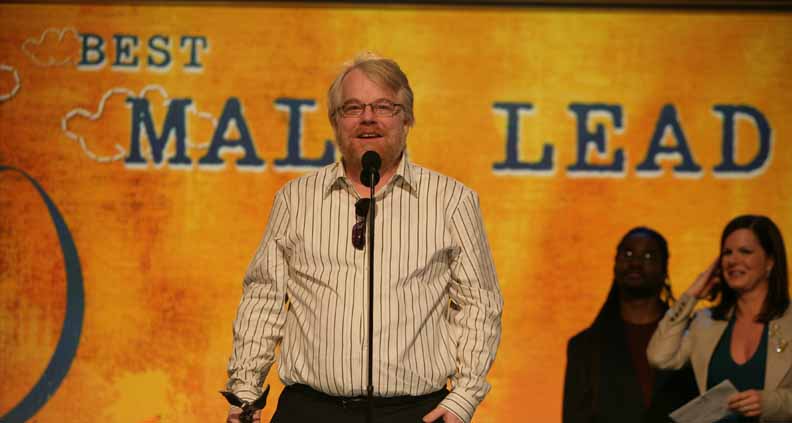
Concurrent with the boom of shows like Breaking Bad, Deadwood, The Wire, Mad Men, Dexter and the aforementioned Sopranos, so too emerged a new “alt-comedy” boom which like the indie music and movies of a decade earlier was by 2010 edging perilously close to the mainstream. And the Spirit Awards were watching.
By the end of the 2000s Spirit Awards hosting assignments were already being handed out more reliably to figures from the comedy world: Sarah Silverman (2006 and 2007), Rainn Wilson (2008) and a pair of British imports, Steve Coogan and Eddie Izzard (2009 and 2010, respectively). In 2010, IFC rebranded itself as an alt-comedy network (“always on, sometimes off”) and the tenor of Spirit Awards ceremonies evolved to match it, with a greater emphasis on comedy and absurdist televisual spectacle.
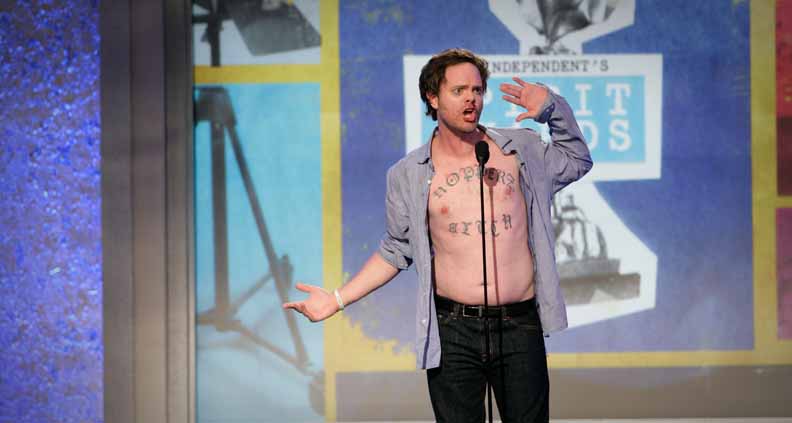
As the Obama Administration rolled on, funny hosts included Joel McHale, Seth Rogan, Andy Samberg, Patton Oswalt, Kumail Nanjiani, Kate McKinnon and Fred Armisen, co-hosting with Kristen Bell for the Spirit Awards 30th anniversary show in 2015. There were sketches and parodies and even an ear-splitting performance by ‘80s metal gods Anvil, subjects of 2010 Best Documentary winner Anvil! The Story of Anvil.
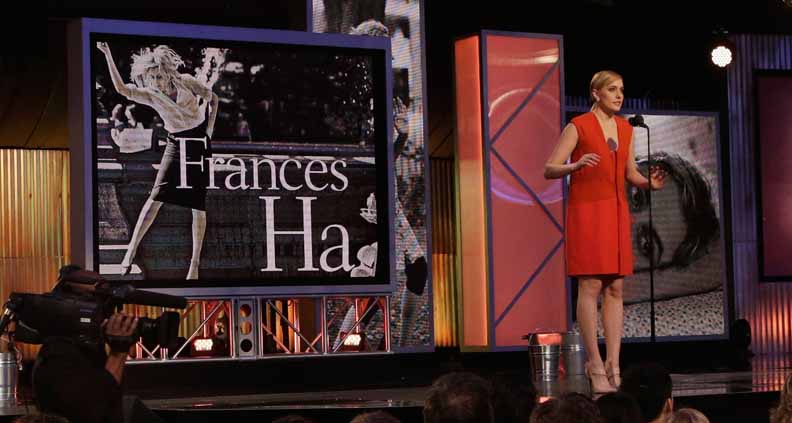
Meanwhile, the Venn diagram between the Spirit Awards and the Oscars was growing evermore circular, with winner overlap between the two shows becoming commonplace. Even so, the Spirit Awards regularly waded into waters reflecting a greater vision of inclusion, with top honors in the early 2010s going to diverse, daring projects like Precious, Short Term 12, Blue is the Warmest Color, Exit Through the Gift Shop, etc.
In 2016, history was made when Mya Taylor won Best Supporting Female at the 2016 Spirit Awards for her electric co-starring performance in Sean Baker’s sex worker farce Tangerine. It was the first win by a transgender actor at a major Hollywood awards show. As traditional notions of binary gender began to dissipate on a mass scale in the late 2010s, a conversation began behind closed doors at the Spirit Awards asking if perhaps there was a better way to do things. After examining the idea from all angles in consultation with leaders in the LGBTQIA+ community, the Spirit Awards introduced fully gender-neutral categories in 2022.
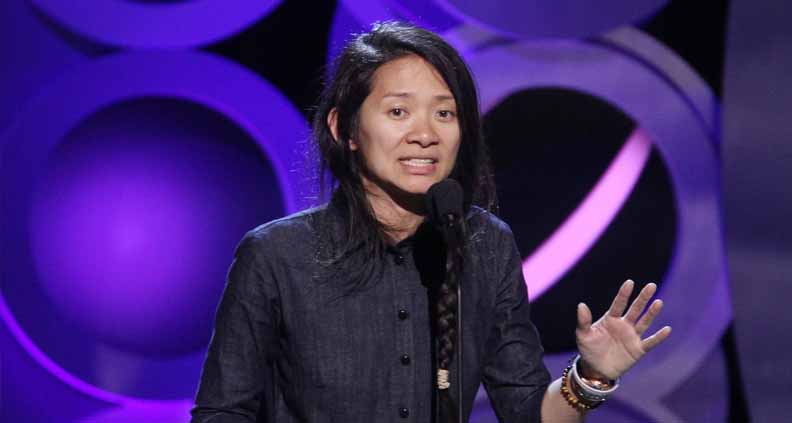
Following Harvey Weinstein’s fall from grace in 2017 and the #MeToo and #TimesUp movements, Film Independent and Spirit Awards doubled down on providing platforms for underrepresented communities. Weinstein, Brett Ratner and a few other deserving targets would also be savaged–brutally–in hosts Nick Kroll and John Mulaney’s opening monologue from 2018. The duo had first teamed up to host the year before, their 2017 monologue accumulating a whopping 3.3 million views on YouTube.
People were starting to watch the show in a big, big way–just not always on IFC. Since 2016 the show had been uploading winners’ acceptance speeches, monologues, sketches and other breakout segments in close(ish) to real time on Film Independent’s social media outlets, resulting in a whopping increase in the awards’ digital audience. With the IFC deal expiring in 2022 the show began livestreaming on YouTube in 2023–the proof of concept of which was (unintentionally) the interactive digital livestream of the show that happened in 2021, when business-as-usual was rudely interrupted by COVID-19.
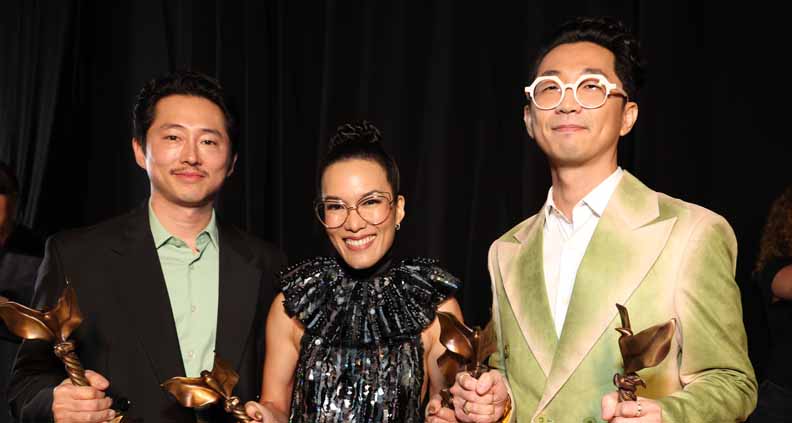
Post-COVID, the ceremony introduced another dramatic innovation: the introduction of TV and streaming categories, which were first given out during host Melissa Villaseñor’s plucky pandemic-year ceremony in 2021. Acknowledging the fact that the Peak TV era now gave idiosyncratic creators room enough to play through episodic storytelling–not to mention make a living–the Spirit Awards have since honored titles including Reservation Dogs, The Bear, I May Destroy You, Pachinko and Squid Game, among others. Perhaps the best moment? The Rehearsal (Best New Non-Scripted or Documentary Series) creator/star Nathan Fielder’s good-natured razzing of late Film Independent President Josh Welsh, whose passion, vision and authenticity guided the Spirit Awards’ many new progressive innovations and evolutions. (Miss you, Josh.)
With Hollywood and the movies it’s always just one damn thing after another. Strikes. Wildfires. Red One. With no shortage of existential threats grinding down atop our beloved medium, there are still somehow more and more great movies every year–just ask anyone with access to our yearly tidal wave of Spirit Award screeners. The next 40 years are about as big a question mark for the world as has ever been, and of course that uncertainty exists in a microcosm for independent film. But for as long as there are stories to tell and tents to be erected, the Spirit Awards will remain here to be shared.
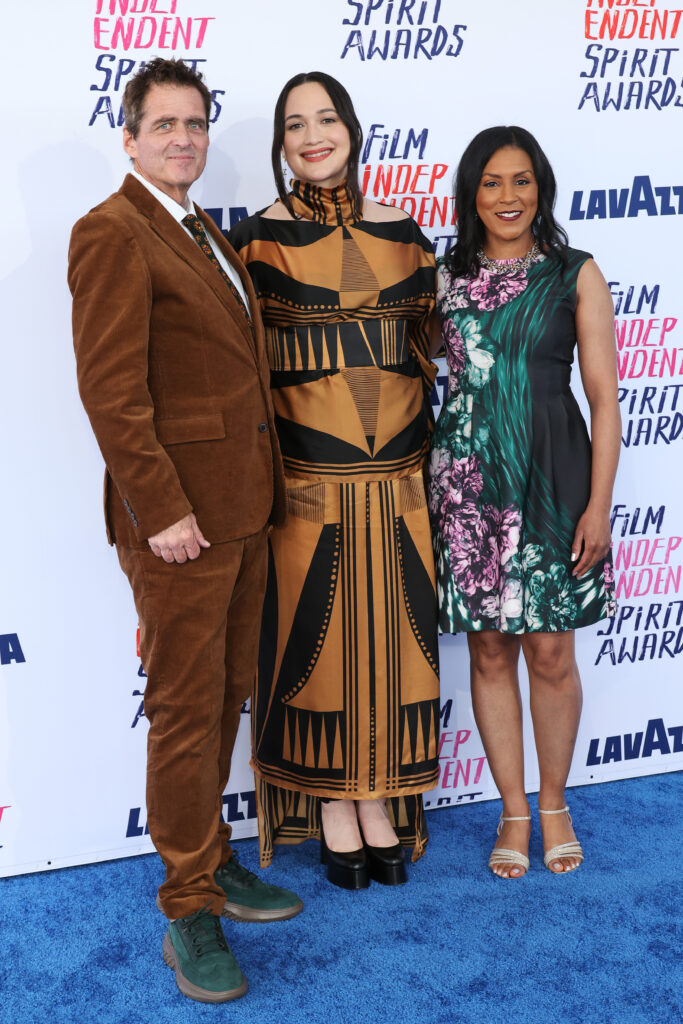
To see all this year’s nominees, click here. Remember to tune in to the 40th Film Independent Spirit Awards on Saturday, February 22, 2025, which will be helmed by returning host and Saturday Night Live alum Aidy Bryant. The show, taking place at the beach in Santa Monica, will be streamed live on the IMDb and Film Independent YouTube channels, and across our social platforms.
Film Independent promotes unique independent voices by helping filmmakers create and advance new work. To support us with a donation, click here.
More Film Independent…
A former member of the Film Independent staff, Matt Warren is a Utah-raised, Louisville-based writer, director and producer whose most recent work is the feature Delicate Arch, now streaming on Screambox and available to rent on all platforms. He has made numerous scripted and unscripted web series, and has worked as a film critic, entertainment journalist, humorist, editor, graphic designer and videographer. His favorite movie is The Night of the Hunter, directed by Charles Laughton.